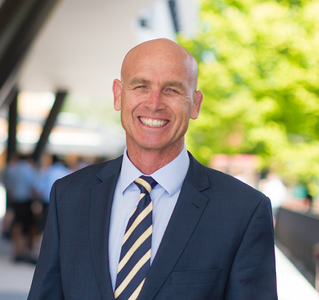From the Headmaster
Have you heard of the ‘iPotty for iPad?’ It is a simple attachment marketed as a toilet training device for digitally connected toddlers. The idea is to keep children entertained on the toilet for as long as it takes to get the job done. While some reviewers declared the innovation one of the best they had seen, I am afraid I do not share their enthusiasm.

There is no doubt digital technologies and the internet have both played important roles in teaching and learning and the development of various cognitive skills; they are critical 21st century skills in a rapidly changing work environment. That said, concerns continue to emerge regarding the potentially detrimental side effects of their use. In recent years dozens of studies have been published exploring the question of what kind of brain the Web is giving us. Led by psychologists, neurobiologists and educators, research suggests that overindulgence in a digital environment can promote cognitive distraction and overload, leading to hurried and distracted thinking and potentially superficial learning. We now know the human brain is highly plastic, with the ability to change as circumstances change. The way we engage with a digital environment can alter the structure of our brain, perhaps even permanently.
One study at Stanford University used a battery of cognitive tests to discover that heavy multimedia users were more easily distracted, had less control over their working memory and generally found it far more difficult to concentrate on tasks. Professor Clifford Nass suggested that those who intensively multitask are ‘suckers for irrelevancy’. Of course, people don’t need an electronic device to multitask or distract them, however, the nature of an online environment makes it that much easier. Whilst working online we are continually bombarded by emails, instant messages, pop-up alerts, tweets, and data feeds.
Contrast this with an environment or pursuits less prone to distraction such as reading or playing a musical instrument. I was speaking with a parent last week who is an avid reader. He was lamenting with me the demise of his children’s reading habits despite the hundreds of hours reading bedtime stories when they were young. He is concerned his children simply did not have the ability to remain focused on reading when so many other distractions available from their phones and computers were so easily accessible. Nicholas Carr is a credible writer on technology who is particularly interested in the impact that different mediums have on attention. He believes that attention is the ‘gateway to thinking’ and is highly susceptible to environmental influences. Using the difference between scuba diving and jet skiing as a metaphor, Carr contrasts reading and surfing on the web.
‘Book reading is like scuba diving; the diver is submerged in a quiet, visually restricted, slow-paced setting with few distractions and, as a result, is required to focus narrowly and think deeply on the limited information that is available to them. In contrast, using the internet is like jet skiing, in which the jet skier is skimming along the surface of the water at high speed, exposed to a broad vista, surrounded by many distractions and only able to focus fleetingly on any one thing.’
The long and controversial debate surrounding how to manage devices at home and how much screen time a child should have is one that will continue to inflame discussion and ignite passionate parenting wars. However, the most important thing is to ensure the discussion occurs.
As students are about to embark on their two-week break from school, some parents are probably dreading the thought of how they might entice their son out into the beautiful Spring weather to socialise with friends without sparking a war. Every family is different and every child similarly responds differently to technology. The truth is, most kids struggle to self-regulate; particularly the younger ones. Finding the balance is the key. It is my hope that the simple joy of reading a book does not get lost in a world of exciting new technologies and parents do not need to reach for distractions like iPotty to capture their children’s attention.
End of Winter Sports
I enjoyed watching a number of Grand Finals over the past few weekends; there has been much success and much to celebrate. I have been impressed with the terrific skill and sportsmanship on display by our boys and the positive encouragement from the sidelines.
Thank you to the teaching staff for their involvement in either coaching or managing our sporting teams. We are fortunate to have fine teachers who give so generously of their time to this valuable aspect of College life. I am also grateful for the generous parent body that have assisted with the coaching and managing of various sporting teams. Their assistance and expertise in developing our young men in the skills and tactics of their respective games is greatly appreciated and speaks volumes of their commitment to our College community.
Finally, a huge thank you to the hard working committees supported admirably by Paul Mead and Clare Kelly, who have worked tirelessly in supporting their respective sports at the College.
A particular thank you to the 2023 Club Presidents:
Australian Rules - Geoff Davidson
Basketball - Mel Berg
Football - Daniel Rothenfluh
Rugby - Tricia Martino
Hockey - Simon Fitzgerald
With the closure of the Winter season, I sense our Year 12 students are beginning to feel finalities. They are starting to realise it will soon be time to leave to move on with life, to strike out a new fulfilment, forging new relationships, finding new communities.
Supporting Safe Communities
Last Sunday was Child Protection Sunday and no issue is more important to this school community than the safety and protection of our children. We stand in solidarity with those who have suffered abuse from church personnel, we pray for justice, healing and peace for them and their families.
Prayer:
Gracious God,
You love and care for all of your children, especially the smallest and most vulnerable.
We entrust to you the lives of children and adults at risk who have been sexually abused, and whose trust and innocence have been destroyed.
Help us to hear their cries of pain and to take responsibility for those whose lives have been broken.
Help us to recognise the hurt of your grace, communities and families will find understanding and support, so that now and in the future their wounds may be healed, and they may find lasting peace.
Let your grace and love fall gently now upon our children and adults at risk, giving them the inner strength, peace, and resilience to seek out assistance when required.
We ask this prayer through our Lord Jesus Christ, your Son, who lives and reigns with you in the unity of the Holy Spirit, God forever and ever.
Amen
Matthew Hutchison
Headmaster





























